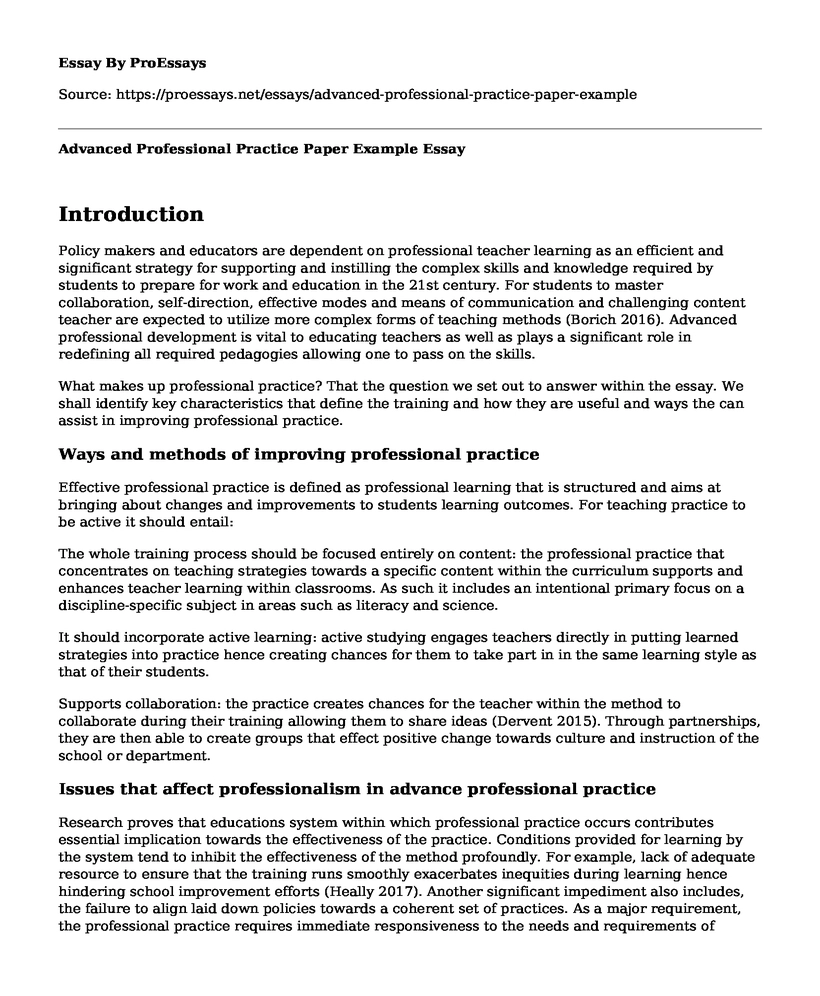Introduction
Policy makers and educators are dependent on professional teacher learning as an efficient and significant strategy for supporting and instilling the complex skills and knowledge required by students to prepare for work and education in the 21st century. For students to master collaboration, self-direction, effective modes and means of communication and challenging content teacher are expected to utilize more complex forms of teaching methods (Borich 2016). Advanced professional development is vital to educating teachers as well as plays a significant role in redefining all required pedagogies allowing one to pass on the skills.
What makes up professional practice? That the question we set out to answer within the essay. We shall identify key characteristics that define the training and how they are useful and ways the can assist in improving professional practice.
Ways and methods of improving professional practice
Effective professional practice is defined as professional learning that is structured and aims at bringing about changes and improvements to students learning outcomes. For teaching practice to be active it should entail:
The whole training process should be focused entirely on content: the professional practice that concentrates on teaching strategies towards a specific content within the curriculum supports and enhances teacher learning within classrooms. As such it includes an intentional primary focus on a discipline-specific subject in areas such as literacy and science.
It should incorporate active learning: active studying engages teachers directly in putting learned strategies into practice hence creating chances for them to take part in in the same learning style as that of their students.
Supports collaboration: the practice creates chances for the teacher within the method to collaborate during their training allowing them to share ideas (Dervent 2015). Through partnerships, they are then able to create groups that effect positive change towards culture and instruction of the school or department.
Issues that affect professionalism in advance professional practice
Research proves that educations system within which professional practice occurs contributes essential implication towards the effectiveness of the practice. Conditions provided for learning by the system tend to inhibit the effectiveness of the method profoundly. For example, lack of adequate resource to ensure that the training runs smoothly exacerbates inequities during learning hence hindering school improvement efforts (Heally 2017). Another significant impediment also includes, the failure to align laid down policies towards a coherent set of practices. As a major requirement, the professional practice requires immediate responsiveness to the needs and requirements of educators.
Major aspects of professional practice
One of the significant elements of professional practice is teaching and learning methods. Teaching and learning are both combined into one process giving it an education-based approach. The two make learning not only an integral part of the process but also allowing them to enable students to engage in separate active learning activities (Borich 2016). The methods foster intentional and deep learning which is mostly concerned with interaction made with others.
What are the changes that occur during childhood and their effects in a professional context?
As a child one undergoes a lot of transitions and the kinds of approaches applied to address them define the character of each. Failure to adequately address such issues effectively results in a social and emotional imbalance within a child which affects them intensely.
To ensure that one functions effectively during the early stages it's crucial that individuals assess themselves individually and ensure that they are well informed on what is required of them during and after the practice (Kennedy 2016). Most of the issues affecting people during professional practice are often based on emotional and socialism. All teacher are expected to uphold professionalism and avoid combining their line of work with their personal issues.
Conclusion
Teaching practice plays a significant role in raising student achievement enabling practitioners and policymakers to understand what professional quality depends and come up with recommended actions to be utilized by policymakers. Professional practice relies entirely on the individual taking the course and the type of education system being used.
References
Borich, G.D., 2016. Observation skills for effective teaching: research-based practice. Routledge.
Dervent, F., 2015. The effect of reflective thinking on the teaching practices of preservice physical education teachers. Issues in Educational Research, 25(3), p.260.
Healy, Deirdre. The dynamics of resistance: Charting pathways through change. Willan, 2017.
Kennedy, M., 2016. Parsing the practice of teaching. Journal of Teacher Education, 67(1), pp.6-17.Muijs, Daniel, and David Reynolds. Effective teaching: Evidence and practice. Sage, 2017.
Cite this page
Advanced Professional Practice Paper Example. (2022, Jul 26). Retrieved from https://proessays.net/essays/advanced-professional-practice-paper-example
If you are the original author of this essay and no longer wish to have it published on the ProEssays website, please click below to request its removal:
- Spokesperson Career Paper Example
- Essay Sample on Job Satisfaction in the Healthcare Workforce
- Essay on Kelly Services: A Leader in Outsourcing & Recruitment Services
- Essay on Motivating African American Males in Public Schools: Exploring the Role of Principals
- Essay Sample on Masters in Social Work: Maximizing Career Opportunities as a Care Specialist
- Essay Example on Understanding Conflict Theory: Causes & Implications of Social Conflicts
- Paper Example on Organization's Performance Metrics







